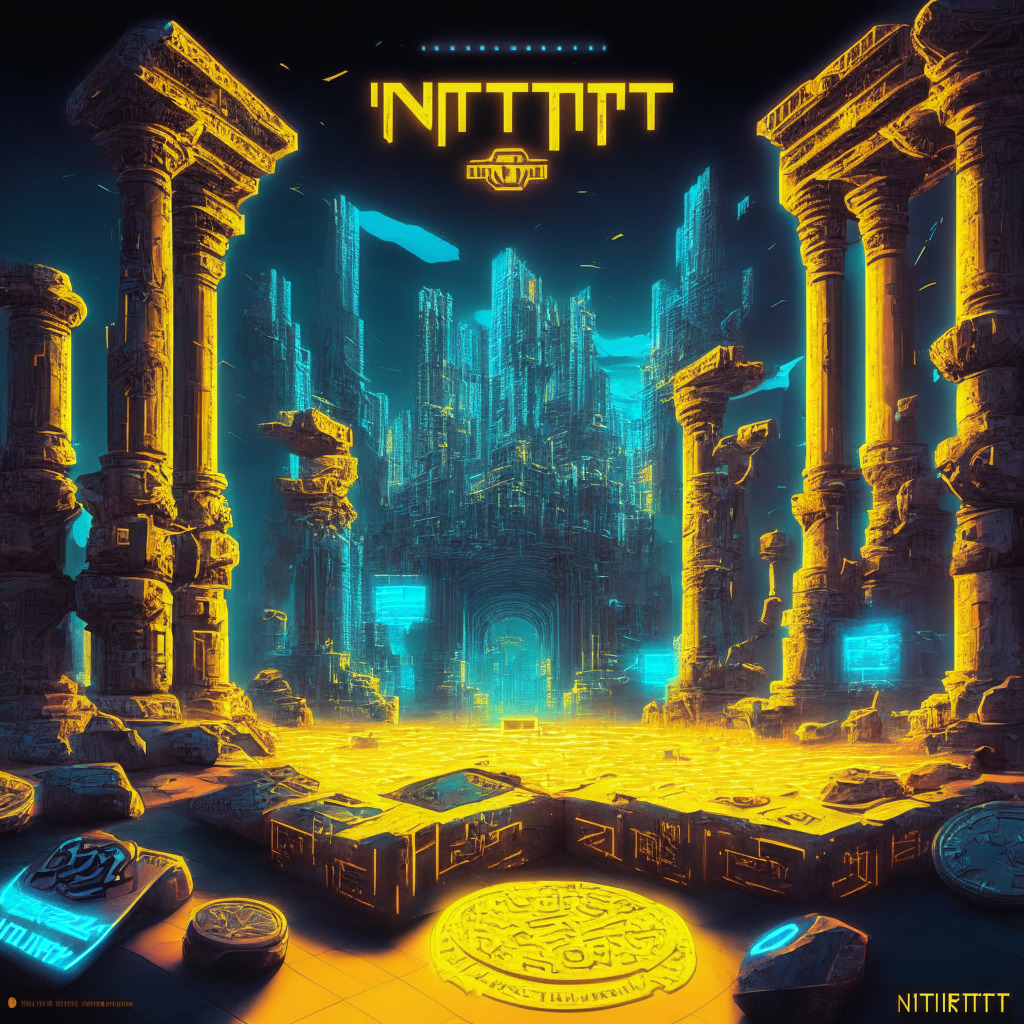Meta’s CEO, Mark Zuckerberg, highlighted the crucial role of AI in the development of the metaverse during a recent interview. By leveraging technology that integrates VR/AR and AI, Zuckerberg aims to establish Meta’s dominance in the 3D immersive metaverse. Despite financial setbacks, he remains committed to the metaverse vision, betting on Llama 2’s technology integration with Meta AI as their unique competitive edge.
Search Results for: Facebook Meta
Meta AI vs OpenAI’s ChatGPT: The Dawn of a New Social Media Interaction Era and Its Ramifications
“Mark Zuckerberg sets to launch Meta AI, interacting across platforms like Instagram and Facebook. Aiming to outdo OpenAI’s ChatGPT, Meta tailors AI products to distinct use cases and entertainment, scheduled to release to selected U.S users and integrate with upcoming smart glasses.”
Deciphering the Paradox: The Ambitious Race to Democratize the Metaverse
Meta’s latest product, Horizon Worlds, aims to bring metaverses to mobile and web platforms. Amid limited accessibility and undisclosed user statistics, the promise of a democratized metaverse that caters to every individual remains uncertain. However, blockchain-based platforms like Decentraland and The Sandbox have chosen to start with PC and web-based experiences, offering a contrast to Meta’s approach.
Meta’s AI Showdown: A Winsome Leap Forward or a Costly Misstep?
“Meta plans to develop an advanced AI model, potentially surpassing OpenAI systems. However, concerns arise around data center construction, chip supply, and ethical issues. Interestingly, AI and crypto’s convergence could pave the path to a tech-advanced future, but with challenges.”
Sui’s Potential Comeback: Evaluating Recent Performance and Prospects of Facebook’s Spin-Off Altcoin
“Sui, a spin-off of Facebook’s Libra/Diem project, is gaining momentum in the crypto market. Despite a recent downturn, its relative strength index and market trends suggest a potential recovery. Sui’s partnerships and connection with Meta are contributing to its fast-paced network growth. However, diversification and due diligence remain essential in cryptocurrency investment.”
Digital Tussles: Examining the Role of Facebook in Thailand’s Crypto Scams
Thailand authorities have warned Facebook, threatening to restrict its operations due to the rampant investment and cryptocurrency scam ads on the platform. The Thai Ministry of Digital Economy and Society states that Facebook’s laxity led to an alarming number of fraudulent ads, with an estimated damage reaching over 10,000 million baht.
Facebook’s Crypto Ad Conundrum: Promoting Blockchain Innovation and Ensuring User Safety
Under growing global regulatory scrutiny, Meta (Facebook) faces ultimatums from Thailand’s DES against fraudulent cryptocurrency scams advertised on its platform. Via lax ad regulations, Facebook’s increasing embrace of blockchain and crypto simultaneously invites potential misuse by malicious actors, emphasizing the need for responsible blockchain adoption.
Facebook vs Thai Government: The Tug of War Over Crypto Scams and Platform Regulation
The Thai government and Facebook are potentially clashing over alleged crypto scams on the social media platform that have deceived over 200,000 Thais. Thailand’s Ministry of Digital Economy and Society faults Facebook for not adequately scrutinizing advertisers, thereby compromising user safety. This situation underscores tech platforms’ challenges of navigating the global digital market amidst varying regulations and cultural contexts. It also raises questions about the balance between user protection and stifling innovation.
Metaverse Losses and Blockchain Gaming: Navigating the Unchartered Waters of Cryptocurrency Integration
“Facebook’s Meta invests heavily in the metaverse despite losses, while in the blockchain gaming space, Alchemy: Battle for Ankhos integrates cryptocurrencies and AI. Meanwhile, Ultra, a crypto gaming startup, builds a tournament platform with its blockchain network for the thriving eSports industry.”
Zuckerberg’s Metaverse: An Undervalued Investment or an Overambitious Gamble?
Mark Zuckerberg’s metaverse initiative cost Facebook and Meta an estimated $21 billion, with tangible outcomes far less than invested. Despite only selling around 20 million units of the Quest VR headset and attracting a mere 200,000 users to Meta’s flagship VR experience, Horizon Worlds, Zuckerberg remains unfazed. Critics argue this detracts from their original advertising business while questioning the financial feasibility of the metaverse project.
Navigating the Crypto Storm: Rising Institutional Involvement, Legal Scuffles, and Metaverse Aspirations
The CME’s regulated bitcoin and ether futures experienced heightened involvement from large traders in Q2 amid financial market volatility, indicating growing trust in such platforms. However, the credibility of key crypto market players is under the scanner as FTX founder Sam Bankman-Fried faces allegations from the DOJ of witness interference. Meanwhile, despite financial struggles, Meta remains committed to its metaverse vision.
Journey into the Metaverse: Meta’s High-Stakes Gamble on a Future Forward Approach
In 2022, Meta reported a loss of $13.7 billion for its Facebook Reality Labs division, the team leading metaverse development. Despite financial challenges, Meta anticipates a brighter future, citing key initiatives such as augmented reality, neural interfaces and social platforms.
Navigating Privacy and Security Paradox: Meta’s Missteps and Crypto Regulations Unveiled
“South Korea strengthens the regulatory environment surrounding cryptocurrencies by setting up an interagency investigative unit to combat crypto-related crimes. However, as cryptocurrencies promise greater freedom, they also attract criticism for providing cover for potential fraud and other illicit activities.”
Alibaba’s Adoption of Meta’s AI Model Llama: Progressive Leap or Strategic Misstep?
“Alibaba, the first Chinese company to use Meta’s AI model Llama, signals a shift to zero-cost development programs. It raises questions about ties between China and Meta, and highlights complexities in the evolving landscape of AI adoption and open-source model integration. The role of such technologies in shaping our world remains to be seen.”
Navigating the European Commission’s Approach to Metaverse Strategy: A Blockchain Perspective
“As the European Commission prepares its strategy on the metaverse, there are high expectations but skepticism too. Key policy issues include property rights, technological standards, and privacy. While regulation is desired, it brings potential challenges, especially potential restrictions on smart contract legality. There’s also concern about Big Tech monopolising the emerging field. These unfolding regulatory chapters will be pivotal to advocates of blockchain and cryptocurrencies, emphasized by the risk metaverse regulation may have on the crypto universe.”
Former Meta Exec Leads Starknet Foundation: Decrypting Decentralization Pros and Cons
The Starknet Foundation recently appointed former Meta executive Diego Oliva as its inaugural CEO, marking a significant milestone. Tasked with driving ecosystem growth and decentralization efforts, Oliva, who has a diverse background, will lead the foundation, which now boasts a seven-person board and a reserve of 5.01 billion tokens.
Apple VisionPro: Crypto Enthusiasts Debate Impact on Metaverse and Adoption Prospects
The Apple VisionPro, a mixed reality headset, has garnered attention from the crypto community for its potential impact on the metaverse. Though it doesn’t compete directly with Meta’s QuestPro, the device facilitates broader discovery and pushes metaverse boundaries, driving immersion and technological innovation.
Apple’s Metaverse Entry: Mass Adoption Boon or Decentralization Threat?
Apple’s Vision Pro headset announcement excites Web3 and open metaverse proponents, who believe better hardware is essential for an interoperable virtual world based on blockchain technology. However, concerns arise over Apple’s potential control over decentralization and guidelines within the metaverse.
Exploring the Metaverse Gold Rush: Opportunities, Risks, and Investment Strategies
The metaverse industry is potentially worth trillions, with investments pouring into blockchain-based projects. However, market cap losses and speculative transactions warrant caution among investors. Despite challenges, tech giants like Microsoft, Apple, Nvidia, and Qualcomm continue developing metaverse strategies, indicating a promising future.
Crypto Adoption in the Metaverse: Opportunities and Challenges Ahead
A Paypal survey reveals that 80% of metaverse users utilize cryptocurrencies, with 56% expecting increased usage in the next five years. However, challenges remain such as interoperability, security of funds, and the development of sophisticated digital wallets for secure transactions and storage.
Preserving World Languages: Meta’s AI Taps into Bible Translations for Text-to-Speech Tech
Meta develops AI-powered text-to-speech technology that can identify over 4,000 languages using religious texts, particularly the Bible, as a source of data. Despite concerns of potential biases, Meta open-sources data and code, aiming to preserve languages and improve speech recognition and generation technology.
Meta’s AI Pursuits: Boon or Bane for the Metaverse Revolution?
Facebook’s rebranding to Meta Platforms Inc signals a leap into the metaverse, but recent AI-focused activities have stirred speculation. Despite setbacks, Meta emphasizes AI’s importance in metaverse development, enabling boundary-pushing products and greater accessibility for users.
Sotheby’s NFT Marketplace and Meta’s Struggles: Blockchain Evolution or Growing Pains?
Sotheby’s auction house launched an on-chain NFT marketplace featuring unique artists, while marketplace Blur introduced Blend, a perpetual NFT lending protocol. Neobank Cogni introduced soulbound NFTs for wallet holders’ KYC information, showing rapid progress and adoption of NFTs in various sectors despite challenges like market imbalances and high-stake project losses.
Meta’s New Debt Shelf Offerings: Impact on Investors and Connection to AI Development
Meta Platforms Inc., the parent company of Facebook, Instagram, and WhatsApp, has recently submitted a […]
Balancing Act: Innovation VS Privacy in Snapchat’s AI Chatbot Controversy
Snapchat’s AI chatbot “My AI” faces scrutiny from UK’s Information Commissioner’s Office due to potential privacy threats to users, including minors. The case highlights the struggle between leveraging tech breakthroughs and protecting user privacy in the hyperconnected social media landscape.
Surge in Aptos Amidst SushiSwap Integration: A Rising Phoenix or Hype Bubble?
Aptos cryptocurrency has shown promising signs of recovery, with a price surge driven by factors including its recent integration with SushiSwap. Despite recent controversies, Aptos’s steady growth forecasts potential to reach $6 by year-end. The post also highlights an intriguing opportunity with Bitcoin BSC (BTCBSC), a stakeable Bitcoin variant with promising features.
Harnessing Blockchain to Tame the AI Beast: Innovation or Involution?
“The introduction of blockchain with AI could enhance transparency, accountability, and audibility, reducing potential misuses of AI. Blockchain can secure data integrity when training AI models, enabling stakeholders to verify the decision-making process. However, real protection against intentional dangers of AI lies in decentralized, blockchain-based, social media platforms.”
The Ripple Effect of PayPal’s PYUSD: Potentially Forcing a Shift in Stablecoin Regulation Debate
The launch of PYUSD, a stablecoin backed by PayPal with over 430 million users, may accelerate crypto adoption and prompt a shift in U.S. policy towards crypto regulation. Despite previous hesitations, the massive user base might force lawmakers to urgently develop a comprehensive regulated framework for stablecoins, heralding a new era of American crypto companies demanding inclusion in economic life.
Unleashing Stablecoins: Assessing PayPal’s PYUSD Launch Amid Political Divides and Regulatory Turbulence
“PayPal’s recent launch of its stablecoin, PYUSD, under the regulatory framework of the New York Department of Financial Services has stirred conversations about stablecoin adoption. Unlike Meta’s unsuccessful Libra, PayPal’s project is viewed more favorably politically, indicating an imminent regulatory framework for stablecoins in the U.S.”
Unveiling FedNow: Monetary Revolution or Strategic Response to Blockchain?
“The ‘FedNow’ service, launched by the U.S. Federal Reserve, aims to make financial transactions swifter. However, its inception may also signify a move towards a Central Bank Digital Currency (CBDC), potentially merging traditional banking with emerging blockchain technologies.”
Clash of Tech Titans: Musk Versus Zuckerberg in Social Media Supremacy Battle
“The clash between Elon Musk and Mark Zuckerberg pertains to claims of intellectual property rights infringement regarding Meta’s release of Threads, a replica of Twitter’s platform. This controversy underscores the importance of balancing innovation and protecting the intellectual property rights within the tech sector, while maintaining ethical practices amidst competition. This serves as a reminder that the path to technological supremacy should be paved with fair practices.”
Binance Survey Reveals Institutional Optimism and Shifting Focus in Crypto Investments
Binance’s recent survey reveals a largely optimistic outlook on the future of cryptocurrencies among its institutional clients. Despite market fluctuations, significant numbers maintained or increased their crypto allocations, highlighting trust in blockchain tech. However, the bullish sentiment towards NFTs and metaverse has faded, and curiosity has shifted to infrastructural investments in crypto space, reflecting the market’s growing maturity.































